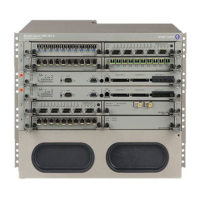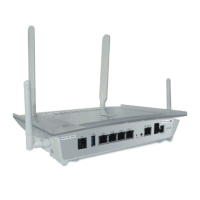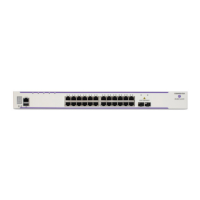Subscriber Services
7750 SR OS Services Guide Page 163
The no form of the command deletes the configuration and the SDP reverts back to forwarding
service packets based on the hash algorithm used for LAG and ECMP.
Default no class-forwarding — Packets of a service bound to this SDP will be forwarded based on the hash
algorithm used for LAG and ECMP.
Parameters default-lsp lsp-name — Specifies the default LSP for the SDP. This LSP name must exist and must
have been associated with this SDP using the lsp-name configured in the
config>service>sdp>lsp context. The default LSP is used to forward packets when there is no
available LSP which matches the packet’s forwarding class. This could be because the LSP
associated with the packet’s forwarding class is down, or that the user did not configure a
mapping of the packet’s forwarding class to an LSP using the config>service>sdp>class-
forwarding>fc command. The default LSP is also used to forward VPLS service multicast/
broadcast packets in the absence of a user configuration indicating an explicit association to one
of the SDP LSPs.
Note that when the default LSP is down, the SDP is also brought down. The user will not be able
to enter the class-forwarding node if the default LSP was not previously specified. In other words
the class-forwarding for this SDP will remain shutdown.
enforce-diffserv-lsp-fc
Syntax [no] enforce-diffserv-lsp-fc
Context config>service>sdp>class-forwarding
Description This command enables checking by RSVP that a Forwarding Class (FC) mapping to an LSP under
the SDP configuration is compatible with the Diff-Serv Class Type (CT) configuration for this LSP.
When the user enables this option, the service manager enquires with RSVP if the FC is supported by
the LSP. RSVP checks if the FC maps to the CT of the LSP, for example, the default class-type value
or the class-type value entered at the LSP configuration level.
If RSVP did not validate the FC, then the service manager will return an error and the check has
failed. In this case, packets matching this FC will be forwarded over the default LSP. Any addition of
an LSP to an SDP that will not satisfy the FC check will also be rejected.
The service manager does no validate the default-lsp FC-to-CT mapping. Whether or not the FC is
validated, the default-lsp will always end up being used in this case.
RSVP will not allow the user to change the CT of the LSP until no SDP with class-based forwarding
enabled and the enforce-diffserv-lsp-fc option enabled is using this LSP. All other SDPs using this
LSP are not concerned by this rule.
The SDP will continue to enforce the mapping of a single LSP per FC. However, when enforce-
diffserv-lsp-fc enabled, RSVP will also enforce the use of a single CT per FC as per the user
configured mapping in RSVP.
If class-forwarding is enabled but enforce-diffserv-lsp-fc is disabled, forwarding of the service
packets will continue to be based on the user entered mapping of FC to LSP name without further
validation as per the existing implementation. The CT of the LSP does not matter in this case.
If class-forwarding is not enabled on the SDP, forwarding of the service packets will continue to be
based on the ECMP/LAG hash routine. The CT of the LSP does not matter in this case.
